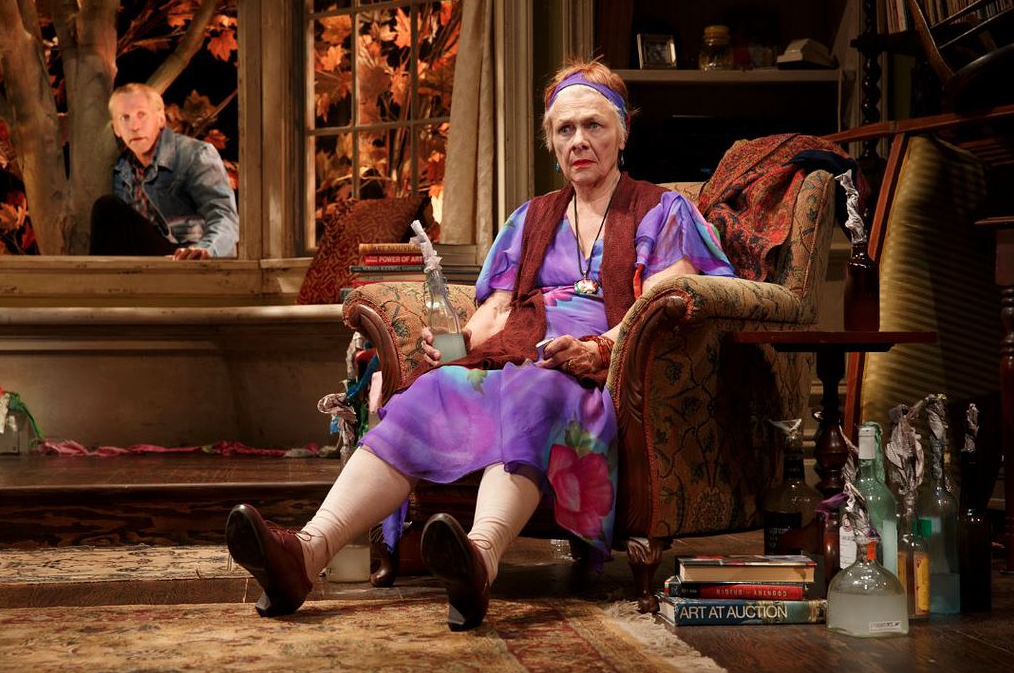
Now is the season of my discontent. After a last-minute flurry of Broadway openings, in advance of Thursday’s deadline for Tony nominations, I find myself with little to rave about. A few of the spring’s new musicals (Rocky, Aladdin) have had their pleasures, and several revivals have been first-rate, most recently Michael Grandage’s smashingly good production of Martin McDonagh’s The Cripple of Inishmaan, starring Daniel Radcliffe. But the crop of new plays has been notably lackluster.
I wasn’t expecting much from The Velocity of Autumn, Eric Coble’s one-act play about an elderly Brooklyn woman threatening to blow herself up in her apartment rather than get carted off to assisted living, and the play didn’t (which is to say, did) disappoint. It’s a cutesy, formulaic two-hander, essentially one long conversation between the stubborn old gal (Estelle Parsons) and her estranged son (Stephen Spinella), who has been called back from New Mexico to try to talk some sense into her.
The play hits all the familiar notes: rueful reflections on the indignities of growing old, revelations about the son’s wayward life, well-paced one-liners to keep the audience amused, and a predictably heartwarming ending. The only reason to sit through it is Estelle Parsons, who at 86 creates an admirably tough character while keeping much of the sentimentality at bay. Then again, if a beloved 86-year-old actress can’t win raves playing a feisty senior citizen threatening to ignite her apartment with Molotov cocktails, Broadway is in more trouble than I thought.
Act One held out more promise, at least for lovers of Moss Hart’s celebrated 1959 autobiography, on which James Lapine has based his affectionate, if ultimately unsatisfying play. Hart, for the uninitiated, was George S. Kaufman’s collaborator on such classic stage comedies as You Can’t Take It With You and The Man Who Came to Dinner, as well as the writer or director of several other famed Broadway shows, including My Fair Lady. Lapine’s stage adaptation takes a quick jaunt through Hart’s impoverished New York City childhood, then focuses mainly on the beginning of the Kaufman-Hart collaboration, on their 1930 comedy Once in a Lifetime.
The play paints a knowing, often amusing picture of the crazy world of Broadway collaboration, as the novice Hart must adapt to the notoriously persnickety Kaufman. Through a neat bit of casting legerdemain, Tony Shalhoub gets to play both Kaufman and Hart (the latter in his older years, narrating much of the story in flashback, while Santino Fontana plays Hart as a young man), and he brings both gravitas and, as the neurotic Kaufman, shrewd comic timing. But the play is too muted and meandering, the backstage tale lacking in either dramatic or comic tension. Twenty minutes could have been trimmed to the play’s advantage, but writer Lapine apparently had no strong director to tell him so. Probably because the director is also James Lapine.
Harvey Fierstein’s new play Casa Valentina is an odd duck, and not just because it focuses on an obscure and puzzling subculture: a Catskills resort in the 1960s where men — heterosexual, all-American, married guys — came to relax by dressing up as women. An array of good Broadway actors, including Patrick Page, John Cullum and Tom McGowan, have a high old time as the cross-dressing family men, strutting around in heels, padded dresses and bouffant hairdos. “Here,” says one of them, “we breathe.”
But what, exactly, is the attraction? Not sexual gratification, we are assured in this straitlaced play. Nor, it appears, very much fun. Barring one brief scene in which the guests get together to do a makeover on a timid newcomer (Gabriel Ebert), these gals seem to spend most of their time sitting around a table, smoking cigarettes and congratulating themselves on being there. The play, set in 1962, doesn’t even do much with the era’s peppy pop music. In one scene, three of the guests do a karaoke rendition of the McGuire Sisters’ “Sugartime.” But their performance is purposely amateurish, and the song is barely audible on a tinny old Victrola. What — it’s 1962, and the place can’t afford a stereo system?
No, this weekend of cross-dressing hijinks quickly devolves into a series of sober, angst-ridden discussions about the survival of the financially challenged resort. One regular (Reed Birney) wants the group to organize into a sorority that would explicitly ban homosexuals. Fierstein, who created empowering drag queens in shows like La Cage aux Folles and Kinky Boots, has written another preachy plea for tolerance for the misunderstood misfits of the world: not just gays (one resort guest turns out to be a closeted homosexual, with a daughter who foams at the mouth with anti-gay prejudice), but the straight guys who are man enough to embrace their feminine side. Right on, Harvey — but after a session with these earnest drag queens, I’m booking next weekend at Grossinger’s.
More Must-Reads From TIME
- The 100 Most Influential People of 2024
- Coco Gauff Is Playing for Herself Now
- Scenes From Pro-Palestinian Encampments Across U.S. Universities
- 6 Compliments That Land Every Time
- If You're Dating Right Now , You're Brave: Column
- The AI That Could Heal a Divided Internet
- Fallout Is a Brilliant Model for the Future of Video Game Adaptations
- Want Weekly Recs on What to Watch, Read, and More? Sign Up for Worth Your Time
Contact us at letters@time.com